#john lackland
Text
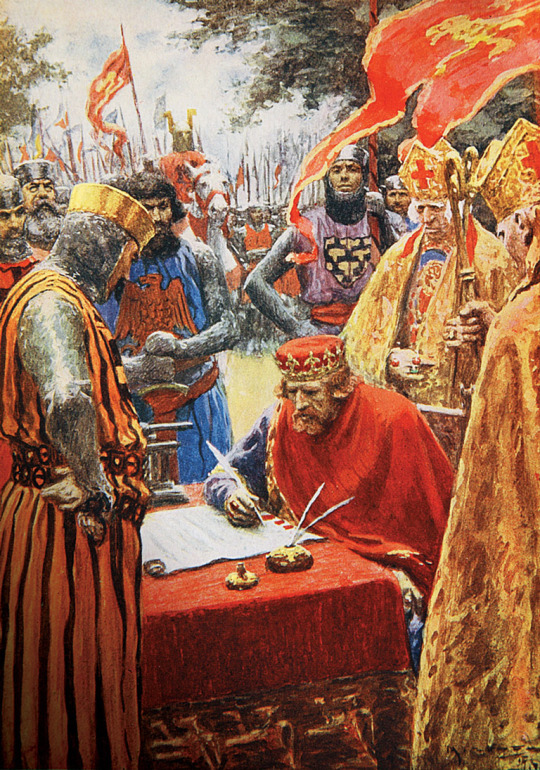
King John reluctantly signing the Magna Carta by Arthur C. Michael
#king john#england#magna carta#art#arthur c michael#john lackland#english#barons#knights#bishops#medieval#mediaeval#middle ages#king#windsor#runnymede#history#knight#baron#bishop#river thames#europe#european#quill pen#wax seal#rebellious#rebellion
219 notes
·
View notes
Text
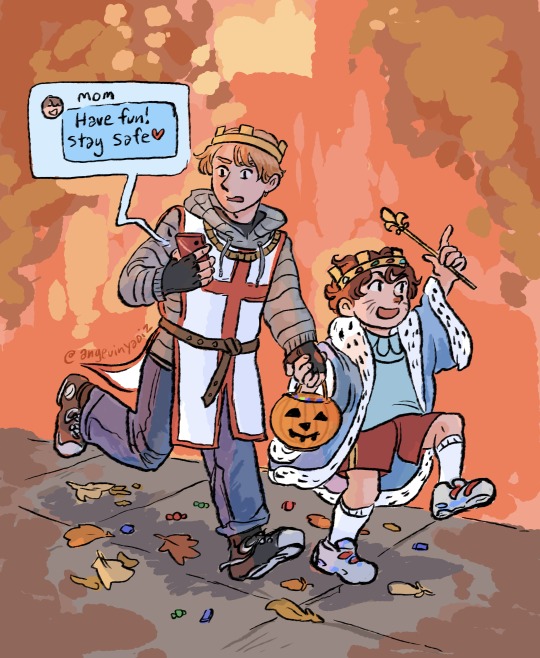
Burger King AU Richard and Johnny are off to do some brotherly trick or treating in their Disney Robin Hood costumes…hopefully they can stay out of trouble and get home before it’s too late, it’s Halloween but still a school night!

(he still went along with it…)
#Halloween#richjohn#disney robin hood#robin hood 1973#richard the lionheart#john lackland#burger king au#bk richard#bk john#bk eleanor#my art
46 notes
·
View notes
Text
Round 1, Match 20
King Richard and Prince John (Robin Hood/English history) vs Cleopatra VII and Ptolemy XIII (Egyptian history)
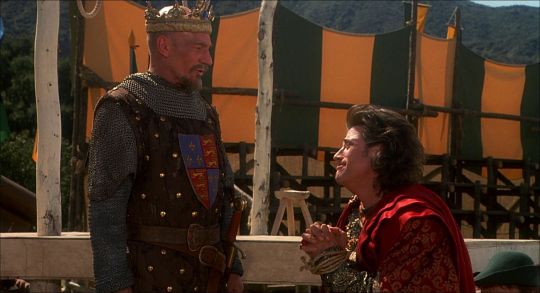

Propaganda and history lesson under break.
King Richard and Prince John
Richard goes off to fight in the Crusades and John plots behind his back to steal and exploit the kingdom!
Poll Runner's Note: That's the Robin Hood legend, and there is some truth to it: While Richard was off on the crusade, John locked up Richard's chancellor Bishop Longchamp, set up his own royal court, and declared himself Richard's heir, over Richard's choice of their nephew Arthur (age 4). He even tried to have Richard declared legally dead so he could claim the throne (he had in fact been taken captive by the Duke of Austria and was then held for ransom by the Holy Roman Emperor). John left his wife to marry the King of France's sister so he'd support his claim, and basically started a civil war which lasted until Richard finally returned home. And that meant paying 100,000 pounds of silver in ransom. Everyone had to pay 25% of their property, on top of additional taxes.
Richard "forgave" John, in that he didn't have him killed and just confiscated most of his land, but he still officially declared his "hate and malevolence" towards John for over a year.
After Richard died five years later, John introduced yet more taxes, including England's first income tax. Why? To pay for a war with France to get back all the land that was lost when John asked the King of France to help him defeat Richard's supporters. A problem he himself caused by fighting with his brother!
Cleopatra VII and Ptolemy XIII
You know
Poll Runner's Note: I sure do, and now I'm going to tell everyone about it! Ptolemy XII, their father, had five children: Berenice, Cleopatra, Arsinoë, Ptolemy XIII, and Ptolemy XIV. Berenice had usurped Ptolemy XII's rule and was executed when he regained power, making Cleopatra his eldest living child. In his will, he declared that when he died Cleopatra and Ptolemy XIII should get married and reign as co-rulers of Egypt.
Ptolemy XII died when Cleopatra was about 18 and Ptolemy XIII was 11, and right from the start she was not interested in this co-ruler business. She started leaving his name off documents, leaving his face off the coins, and generally acting like she's the only ruler in Egypt. Unfortunately for her, Ptolemy's guardians weren't keen on being demoted from "power behind the throne" to "glorified babysitter", and they deposed Cleopatra and forced her to flee to Syria, where she raised an army and started a war against her brother. It didn't go well for her, and things were looking bad for her until Julius Caesar showed up with his army.
Caesar was 1) Already mad at Ptolemy's advisors for killing Pompey who he'd wanted to spare and 2) famously a huge slut so Cleopatra was pretty easily able to convince him to restore her to power.
It's at this point Arsinoë shows up with her army. She joins forces with Ptolemy XIII, declares herself Queen Arsinoë IV, and beseiges Cleopatra and Caesar in the palace complex. For five brutal months, they battled through the city. The fires are said to by how the Library of Alexandria was lost, which is probably a legend but it was still devastating. Ceasar himself almost drowned while fleeing Arsinoë's forces at the Battle of Pharos Island.
Finally Caesar's allies show up with their armies, and Ptolemy drowned trying to flee across the Nile while Arsinoë was taken prisoner. She was brought back to Rome as part of Caesar's triumph, but her life was spared and she lived out the rest of her days at the Temple of Artemis in Ephesus. This was about five years because Cleopatra later persuaded Mark Antony to have her murdered right there in the temple.
Cleopatra married her youngest brother Ptolemy XIV, before finally poisoning him so she could make her son Caesarion the new Pharaoh.
Cleopatra was at least partially responsible for the deaths of all her siblings except the one her father killed, and the struggles between them were devastating for Egypt and caused a lot of suffering. These are some legitimately awful siblings.
#worst siblings tournament#round 1#poll#english history#egyptian history#King Richard I#Richard Lionheart#King John#John Lackland#Cleopatra#ptolemaic egypt#Arsinoe#poll tournament
5 notes
·
View notes
Text
Some Lion in Winter screen caps for all of our sorrows


Wanted to go for more like... redhead/blond Plantagenets
#hobbit talks#andy rambles#hobbit draws#the lion in winter#plantagenets#medieval history#richard the lionheart#john lackland#phillipe augustus#geoffrey duke of brittany
10 notes
·
View notes
Text
Capétiens vs Plantagenêts: a matter of suzerainty.
It was also his position as suzerain which gave Louis VII the chance of interfering in and inflaming the quarrels which raged in the Angevin family. This was an effective means of weakening his great antagonist. Henry II and Eleanor produced a large family, and reared four of their sons to the age at which custom demanded that they should be provided for. Their eldest son Henry was granted Normandy in October 1160 and was associated with his father on the throne of England in 1170. Richard was given Aquitaine in 1169 and Geoffrey Brittany in 1175. John, the youngest child of Henry and Eleanor, was not old enough to be entrusted with any estates until the very last years of his father's reign, and by the time he came of age all the available lands had been given away. As Duke of Normandy, Duke of Aquitaine, Count of Poitiers, the sons of Henry II came to perform homage to the King of France and became his men. It was in vain that Henry II sought to utilise the Norman procedure of pariage to maintain the unity of his continental territories in favour of his eldest son, the "Young King" Henry. (Under pariage the eldest son succeeded to all the heritable property and was alone answerable for it to the suzerain; each of his brothers received a share, but held it of him). This device could not be put into full operation in Aquitaine, which was not part of Henry's heritage but Eleanor's. And when she granted it to Richard, he owed homage not to his father or his eldest brother, but to the King of France. The Young King Henry had done homage as Duke of Normandy to Louis VII in October 1160. When he repeated his homage in 1170 it was made to embrace Anjou, Maine, and Brittany as well. At the same time Richard did homage to Louis for Aquitaine.
It is true that in 1174 Henry II compelled his sons to perform homage to him after their rebellion, but this new homage did not necessarily annul their homages to the King of France. Henry II himself had done homage to Louis VII in 1151 and again in 1169, and was to perform it yet again to Louis's successor, Philip Augustus, in 1180. Thus throughout the conflict between Louis VII and Henry II the French king's suzerainty was affirmed and recognised. This did not save Louis from defeats at his vassal's hands. Nevertheless, to judge from the Toulouse affair in 1159, Louis' suzerainty occasionally cramped Henry's style, and put him in the wrong in the eyes of contemporaries, including the barons of his continental fiefs. To play the rebel vassal was hardly prudent for a king when many of his own vassals were rebelliously inclined. It was not that the idea of rebellion itself shocked feudal society. On the contrary, it was one of the legitimate courses open to a vassal needing to safeguard his rights against the encroachments of his suzerain. But in the disputes between Louis VII and Henry II, Henry was the law-breaker as well as the vassal in revolt. For his rebelliousness against an impeccable suzerain there could be no justification.
It may be objected that Louis VII was constantly intriguing with Eleanor of Aquitaine and with Henry II's sons. But after all Eleanor, as Duchess of Aquitaine, was herself a royal vassal. Two of Henry's sons had done homage to Louis. Another, Geoffrey, by dint of his father's vassalage, was the French king's rear-vassal. And the king had, as suzerain, not merely the right but the duty to concern himself with the welfare and harmony of his great vassal's family, to ensure that a proper settlement was made on the sons. It would be unfair to accuse Louis of hypocrisy; nor did Henry ever complain that the French king was making trouble in his family. Louis' own grievances against Henry were many and varied, and Henry never made a serious effort to deny their validity.
Thus from 1154 to 1180 Henry II had the appearance of a vassal engaged in unjustifiable revolt against his suzerain. This line of conduct undermined his own position. It constantly reminded the baronage of the Angevin fiefs that the King of France was Henry's suzerain- if only because his suzerainty was so often invoked. And it helped to prevent the fusion of the individual elements of the Angevin empire on the continent. Provincial separation, already too strong for Angevin rule to subdue, was reinforced.
Robert Fawtier- The Capetian Kings of France
#xii#robert fawtier#the capetian kings of france#louis vii#henry ii of england#aliénor d'aquitaine#henry the young king#richard the lionheart#geoffrey plantagenêt#john lackland#jean sans terre
7 notes
·
View notes
Text
So I was watching a little bit of Robin Hood: Prince of Thieves because I was sleeping over at my bestie's house and when I arrived, it was on TV. I mostly did two things:
1. yell at the TV and my mom and bestie's mom because I hate Richard I of England even more than I hate John Lackland and I was arguing that Richard I was a terrible ruler and the only reason why England was stable was that John Lackland overthrew the regent Richard I had placed in charge. Also Richard I didn't give two shits for England (he actually once said that he would have sold England to someone, but he couldn't find anyone with sufficient funds).
2. fawning over how attractive Alan Rickman is in this goddamn movie. I mean, just look at him!

(By the way, if you care more about me than Richard I cared for England, to why I disappeared, keep reading)
School and schoolwork and homework and the stress that revolves around all of that
(this one is probably the most important) My grandmother died about two months ago (6 December 2022) and I've been deeply affected by her loss
I'm in 10000000 extracirriculars
I've been forgetting to post shitposts
I've been forgetting to get on this app
I've been focusing on writing and trying to complete a writing project I started two years ago
I'm just busy
So yeah. I'm probably going to disappear again.
#robin hood: prince of thieves#robin hood#sheriff of nottingham#alan rickman#richard i#richard the lionheart#john lackland#king john#snevans is my life source always
6 notes
·
View notes
Text
Japan cannot be even an imitation (poetry)
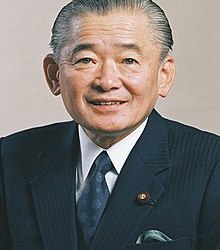
Noboru Takeshita (wiki)
Japan imitates Britain, parliamentary democracy
It's not even an imitation.
England as early as 1215
realized democracy. (Magna Carta)
It's the stupid king "John Lackland"
Let the lords recognize their authority,
In other words, it put restrictions on the power of the king.
The lords have earned the right to act without compromise.
In the case of Japan, a stupid prime minister (substantial king)
Although we have produced many
If Japanese people don't like that guy
We won’t take action to expel him.
This is an abdication of citizenship.
(In other words, many people do not go to vote.)
I think without resorting to force
We could get rid of the idiots—
From citizens who do not vote,
We should take away the right to vote.
Fighting and winning is democracy.
Japan, how long will you be an imitation?
Former Prime Minister of Japan Noboru Takeshita declared: "Democracy is numbers." He said democracy is to force a majority vote onto the seats won by money election.
(2021.10.10)
#Japan imitates Britain#democracy#imitation#Magna Carta#John Lackland#vote#Noboru Takeshita#Democracy is numbers#money election#poetry#rei morishita
5 notes
·
View notes
Text
king john is so funny
His dad didn’t give him any lands to inherit and then proceeded to called him Lackland as a joke (a nickname that stuck), and he sucked so much as king that no other english king was ever called john again. So he’s not john I, just john
truly one of the monarchs of all time
1 note
·
View note
Text
Richard being imprisoned by the HRE while john and Philip try seize his lands
Richard Lionheart: this really isn’t fair🎵
John & Philip: we really couldn’t care 🎶
1 note
·
View note
Text
King John tote bag

King John of England
by CreativeHistory
#King John#John Lackland#Plantagenet#King of England#civil war#Barons War#Magna Carta#tote bag#medieval history#English history#Zazzle
0 notes
Text
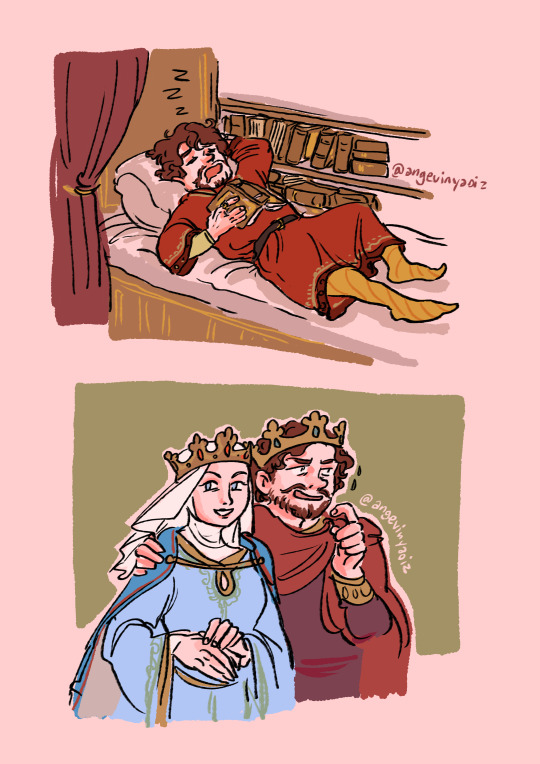
John’s little booknook bookmobile + Isabella of Angouleme (Retrospring requests)
#Isabella of Angouleme#John I of England#John lackland#13th century#12th century#king John I#my art#requests
15 notes
·
View notes
Text
you know who should be the next tumblr sexyman? richard III
9 notes
·
View notes
Text
im reading an actual novel by goldman my good friend james goldman and if it sucks im gonna kill everyone and then myself
8 notes
·
View notes
Text
ok i DO NOT THINK they actually called him john lackland at his fucking coronation
#princess of thieves#pot liveblogging 2k22#disney#i can't believe that was in the script that's amazing#disney was like 'we know about history we just don't care'#should i tag this english history? i wonder medievalists feel about this movie#english history#plantagenets#there i did it#john lackland lol#THAT'S IN THE SCRIPT#IT'S IN THE MOVIE the archbishop literally calls him john lackland of england as he ANOINTS HIS HEAD IN OIL#i can't even
2 notes
·
View notes
Text
its always funny bc. Of course it's the shota stuff that gets struck, but I've also drawn plenty of Older Teen NSFW stuff too which if it was Real would still be Illegal under the Law but no one cares about that bc the characters "look adult" or whatever which is lol
1 note
·
View note
Photo

William the Conqueror, Duke of Normandy & King of England (1066-1087)
Map published in “L’Histoire” n°424 (June 2016); included in the “World Historical Atlas” by Christian Grataloup, Les Arènes/L’Histoire, 2019
by cartesdhistoire
In 1066, the victory at Hastings linked England to the continent for several centuries, despite the difficult conquest of the North and Cornwall. In about ten years, William extended Norman power from the Scottish marches to Maine. He stitched the territory with castles, took control of the administration and avoided the creation of vast vassal fiefdoms, apart from the counties facing Wales and Scotland. The duke-king, upon his death in 1087, was in a position to compete with the king of France.
1035: On the death of his father, William becomes Duke of Normandy at the age of 8.
1047: Battle of Val-ès-Dunes. William, allied with the French king Henry I, defeats a coalition of rebel Norman barons.
1051: Edward the Confessor, King of England, asks William to succeed him.
1052: Breakdown of the alliance between William and Henry I.
Around 1053: Marriage of William and Mathilde of Flanders.
1063: Harold is taken prisoner by Gui de Ponthieu. William had him released and demanded that he undertake to recognize him as king of England upon Edward's death.
1066, October 14: Battle of Hastings.
1066, December 25: William crowned king of England.
1069-1070: Rebellion in northern England and its suppression.
1083: Death of Queen Mathilde. She is buried in the Abbaye aux Dames de Caen, which she founded.
1085-1086: Census for the completion of the Domesday Book.
1087: Death of William. He is buried in the Men's Abbey of Caen, which he founded. His eldest son, Robert Courteheuse, succeeded him as Duke of Normandy; his third son William II Roux becomes king of England.
1204: Philippe Auguste, king of France, defeats John Lackland and conquers Normandy. It is the end of the cross-Channel empire created by William.
96 notes
·
View notes